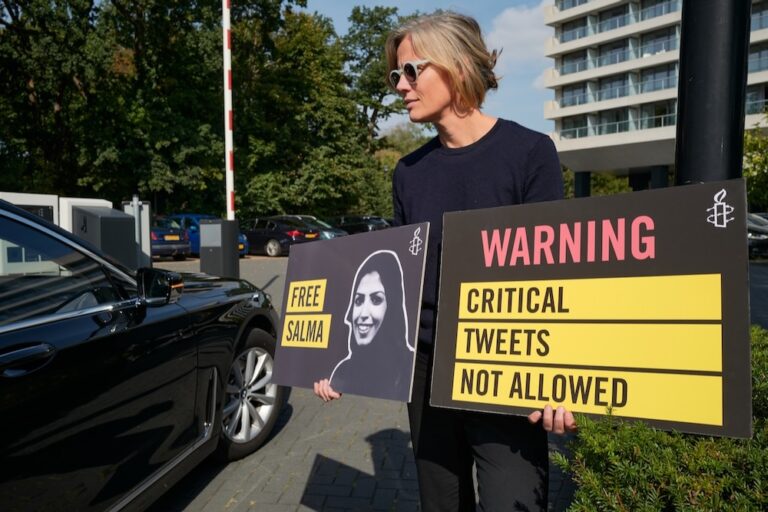"The message to Saudi Arabia's critics seems clear: Don't speak out or you will stay behind bars until you have learned your lesson and can be released," said Human Rights Watch.
(Human Rights Watch/IFEX) – Munich, February 22, 2011 – Saudi authorities have released four political prisoners and lifted a ban on foreign travel on a blogger, since February 15, 2011, but arrested other critics, Human Rights Watch said today. The authorities are also keeping other dissidents in long-term detention or under long-term travel bans.
“Recycling political prisoners won’t appease demands for democratic change,” said Christoph Wilcke, Middle East researcher at Human Rights Watch. “While Arab rulers topple and reforms get underway elsewhere in the region, Saudi princes have offered no concessions.”
On February 20 Saudi authorities released three Shi’a activists held solely for publicly demanding equal rights for Shi’a Saudis. The Saudi domestic intelligence service, the General Directorate for Investigations, had arrested Munir al-Jassas in November 2009, and Muhammad Al Libad in January 2010 and detained them without charge since then. A third, Ramzi Jamal, was held since November 2010.
On February 15 the intelligence service released Dr. Muhammad al-‘Abd al-Karim, arrested on December 6, apparently for an article he posted on his Facebook page analyzing the political fault lines of the ruling family. Al-‘Abd al-Karim, a professor of Islamic jurisprudence at Riyadh’s Imam Muhammad University, wondered aloud whether the kingdom would remain a political entity if the Saud family ceased to rule. He had also served for the past year as a part-time consultant for the Human Rights Commission, a government ministry. The commission did not publicly comment on his arrest.
Also on February 15, the well-known blogger Fu’ad al-Farhan, whom intelligence forces arbitrarily detained from November 2007 until April 2008, tweeted that his ban on foreign travel had been “officially” lifted. Earlier in February al-Farhan met the governor of Mecca Province, Prince Khalid al-Faisal, to discuss the repercussions from the recent deadly floods in Jeddah.
On February 16 the General Directorate for Investigations arrested six of the founders of Saudi Arabia’s first political party.
Still in detention since June 2010 is human rights activist Mikhlif al-Shammari, whom officials locked up for “annoying others.”
Also still in detention are Sulaiman al-Rashudi, Sa’ud al-Hashimi, Musa al-Qarni, and al-Sharif Saif al-Din Shahin. They are among the best-known group of political reformers arrested in February 2007 in Jeddah for reportedly planning to set up a political party. In August 2010, a court denied a motion seeking their release, claiming a trial had begun, although their lawyers have been unable to meet their detained clients or learn the charges against them. Blogging about the arbitrary arrest of the Jeddah group is what landed Fu’ad al-Farhan in jail in 2007.
Authorities have not lifted the foreign travel bans imposed on peaceful political reformers Ali al-Dumaini, Abdullah al-Hamid, and Matrook al-Faleh, imposed in 2005. The three were among 12 principal organizers of petitions calling for political reform in 2003 and 2004, before they were arrested in June 2004. They were sentenced to long prison terms in May 2005 but then received a pardon from King Abdullah in August of that year. Ra’if Badawi, who runs secular and human rights websites in Saudi Arabia, such as http://www.humanf.org , received his travel ban in 2009, after the prosecution started a case against him for setting up a website that allegedly “insults Islam.” On November 3, 2010, the Association for Civil and Political Rights in Saudi Arabia, an unlicensed group, announced its intention to sue the Interior Ministry for arbitrary imposition of travel bans. A similar attempt by lawyer Abd al-Rahman al-Lahim in 2006 failed. The authorities lifted his travel ban in 2009.
Since December 2010, Saudi political reformers have planned two demonstrations but cancelled them upon Interior Ministry instructions. Authorities did not interfere in another demonstration, consisting of 40 women demanding the release or fair trial of their male relatives detained for years without charge, which took place in front of the Interior Ministry on February 5. Saudi Arabia bans all demonstrations as a matter of policy.
“The message to Saudi Arabia’s critics seems clear: don’t speak out or you will stay behind bars until you have learned your lesson and can be released,” said Wilcke.


